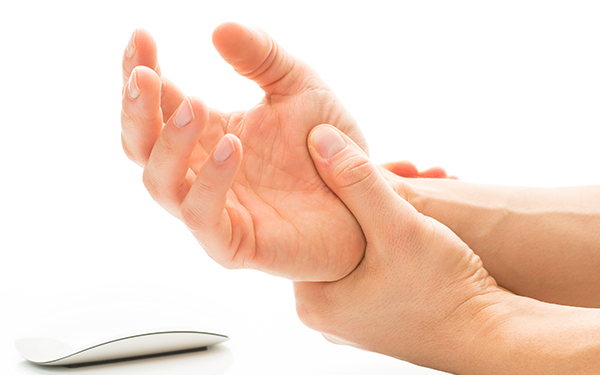Carpal Tunnel Syndrome
Carpal Tunnel Syndrome (CTS) occurs when the median nerve, which runs through the wrist, becomes compressed by fluid or scar tissue. CTS affects over two million adults in America making it the most common peripheral nerve compression syndrome. The condition affects more women than men and is more prevalent in those who use their hands in a repetitive manner such as carpenters, pianists, mechanics, athletes, and computer workers. Although CTS is classified as a non-inflammatory condition, it is often associated with arthritis, tendonitis, hypothyroidism, gout, diabetes, and pregnancy, all of which can include inflammation.
Symptoms & Diagnosis
Early symptoms of CTS include numbness, pain, and tingling in the palm of the hand and the first three fingers. Most often, the fifth finger is not affected. Although less common, CTS can present with arm, shoulder, and neck pain as well. There are specific and low-risk orthopedic tests that can be performed to confirm the diagnosis. Additionally, nerve conduction velocity studies are often used to detect CTS in the early stages, or MRI studies can be performed on patients with atypical symptoms.
Many people affected by CTS will awaken during the night with hand pain and/or numbness. In chronic or severe cases of CTS, paresthesia (aka “pins and needles”) may occur with weakening of grip strength caused by degeneration of the muscles at the base of the thumb.
Medical Treatment
Most cases of CTS are medically treated with lifestyle changes (such as avoiding activities that involve repetitive wrist movements) and medications such as NSAIDs, diuretics, or oral steroids. Cases of CTS that fail to respond to these treatments are often treated with injections of corticosteroids into the carpal tunnel or even invasive carpal tunnel surgery. Some patients may initially respond well to the medical treatment of CTS, but there is always a degree of risk associated with drugs and surgery. Furthermore, many patients who choose drugs and surgery as a primary CTS treatment often unfortunately experience similar symptoms in the future.

It is well known that chiropractors are experts at manipulating and moving the joints between bones of the body. Since small, movable wrist bones help form the carpal tunnel structure, chiropractic naturally becomes a great option for people suffering from CTS.
Chiropractic adjustments help to break up scar tissue adhesions, reduce inflammation, and relieve the dysfunction associated with CTS simply by increasing blood flow to the involved area. Additionally, Divine Design Natural Health uses specific nutritional supplements, cold laser therapy, and detoxification approaches to reduce inflammation and rebuild joints naturally.



